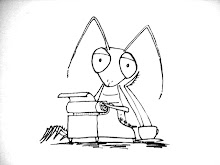There is a corner store a block away, a Dunkin' Donuts and a Del's Frozen Lemonade. He has friends who live in the neighborhood. He has a good bike that he rides well. There are parks and playgrounds and athletic fields all within walking distance.
So why don't we let him walk to them?
No, we arrange activities for him: soccer, swimming, choir, basketball. We drop him off at his friend's houses, or they get dropped off here. We know where he is and who he's with all the time. We're not alone. That seems to be how things are today. Everyone does it. It's all about safety now: car seats, helmets, afterschool activities and all the rest. So why does it bother me?
It doesn't seem right, somehow.
***************
"Go play!" Most of us will remember those words, I think. "Turn off that TV! Go outside and play! And be back here for suppertime. Now get out."
And my folks didn't mean go out in the yard, either. They wanted you gone. Go play.
So I would walk down to a friend's house. Always to the back door, that was the custom. Children call at the back door. And I would knock or ring.
"Can Bob come out?"
Either he could or he couldn't. If he came out, we'd move on to another house. "Is Mike home?" "Can Tim come out?" "Hi, Mrs. Quinlan. Is Francis here?" Our little gang of urchins slowly grew.
No one asked where we were going. No one asked what we meant to do. We couldn't have answered anyway. We didn't know. We were going somewhere to do something. And we would all be back by suppertime.
Or else.
And so we wandered around, looking for trouble, and usually finding it. We'd go hang out at a playground, or at the corner store. We'd go down to one of the factories and play on the docks. Or down behind the factories, to the visibly polluted swamp we called The Muck. Maybe we'd cross over and watch for trains by the tracks. The freight trains were long ones then, very good for flattening pennies. In summer, under the railroad bridges was shady and cool, and there were plenty of empty bottles to break.
There was something strangely satisfying about whipping an empty beer bottle at a stone wall, hearing it pop and shatter.
We walked to school, alone or in impromptu groups. School was a half mile away. The crossing guards were never where we wanted them to be. We weren't too eager to get to school in the first place. We certainly wouldn't go out of our way to get there. We curb-danced. We crossed busy streets. We took our chances. We managed.
We learned about big kid-little kid. Run your mouth at the playground, you might find yourself dumped headfirst into a trash barrel. Ask me how I know that. We learned that keeping your mouth shut is often smart, that certain people should be given a wide berth, others avoided altogether.
Adults were among those to be avoided. We stayed as far away from supervision as possible. Get off school grounds as soon as the bell rings. Don't go straight home. On a bus, sit at the back. Swear a lot. If you don't get caught, you don't get punished. Freedom.
We were latchkey kids and we loved it, I did, anyway: that glorious time between school and supper when the house was mine. Raid the fridge. Turn up the radio as loud as you want. Or have some quiet. The silence of the empty house never bothered me. Not if quiet was what I was after. Those are some of my fondest memories. I know I can't be the only one.
***************
We weren't neglected. We weren't unloved. Our parents did what they needed to do. They lived in their world; we lived in ours. Sometimes these worlds intersected. At least half of us were polished up and brought to one church or another on Sunday. And God help you if the school ever called home to report misbehavior, or if one of the neighbors ratted you out for some misdeed. I think we were all a bit afraid of our fathers.
We lived in a decaying factory town: the kind of place people from the tony suburbs think is very dangerous. It wasn't, especially. There was crime, of course. Every city has that. Still, it was more run-down than anything else. Most of us managed.
Most of us.
It was a different time then, but not the way people often mean that. When I was in first grade, one of my classmates was kidnapped and murdered by a serial killer. I'm not making that up. You don't forget something like that.
We didn't know that then, of course. He wasn't part of our little group. We didn't know him well. We knew who he was, though. We knew he had come to grief, and we knew he would not be coming back.
You don't forget something like that.
For a year or so after, I couldn't explore the woods, or go behind the factories or down by the railroad tracks without a bit of fear. I wasn't afraid of the killer, though. I had this nagging fear that the next time we stirred up a pile of leaves, or crawled through a drainage pipe, or went down to The Muck, we were going to find the body. I know I can't be the only one.
They found his body in a basement six years later.
Our parents gave us all the standard lecture: "If you're out somewhere and someone bothers you, if you don't feel right about it, you get the hell out of there. You just run like hell, ok? And don't you ever get into a car with someone you don't know. Ever. You understand?"
We understood.
And yet, what is remarkable is what our parents didn't do. They didn't forbid us to wander the city. They didn't keep us home in the yard. They didn't make us call home regularly. They hugged us. They told us how we were to handle ourselves. Then they sent us back out to play. Go play.
It was a different time back then.
***************
The boy sat at the edge of the schoolyard, crying silently. He didn't seem hurt. He was far too old to cry in public without a very good reason. Two girls came over to console him. One put her arm around him and said something softly in his ear. A strange display in the swirl of running, laughing children waiting for the morning bell.
Then I noticed the balloon.
In her hand, she held a yellow balloon. On the balloon, the boy had written in black marker "Alexis - we will miss you." And I remembered that one of my son's classmates had been killed in a car crash that weekend. The car seat and belt had not saved her. The bell rang. The three children took their place in line: a line with one child less than the week before.
***************
An email circulated in the community last year. It seemed there was a registered sex offender working at a local store. He had tried to get the name and address of a 5 year-old girl. Her mother had intervened, confiscated the credit card slip, and confirmed everything with the police.
The email passed from parent to parent. It was picked up and forwarded by teachers and principals. Within a few days, almost everyone had received it. There was just one problem.
None of it was true.
The following week, the police announced that the email was a hoax. They were investigating.
***************
I walked my son to school this morning, as always. I'll be there at quarter to three to pick him up, as always. Maybe he'll do his homework and ride his bike on the sidewalk in front of the house after. I don't know why this bothers me, but it does. It doesn't seem right somehow. Why don't I just tell him to go play?
They say it's a different world today. Perhaps. Compared to where I grew up, my world is cleaner, safer, and nicer now. We have almost everything within walking distance. It's why we moved here. Yet we keep our children close, almost never out of our sight. Why? Are we trying to protect them? Or are we trying to protect ourselves?
Why don't I tell him to go play?
Respectfully Yours,
Cricket














